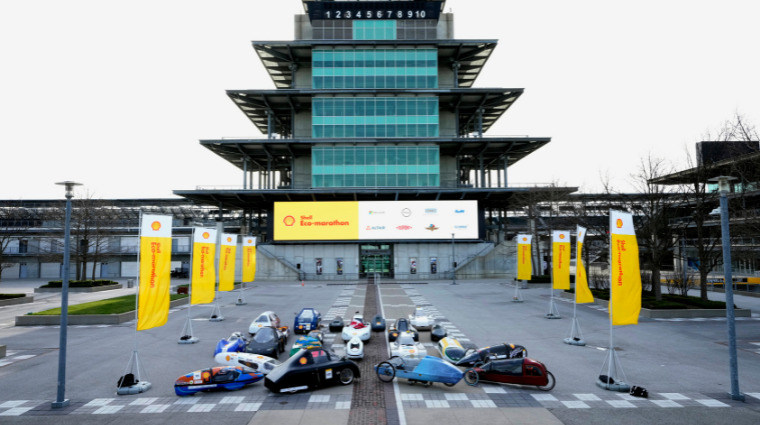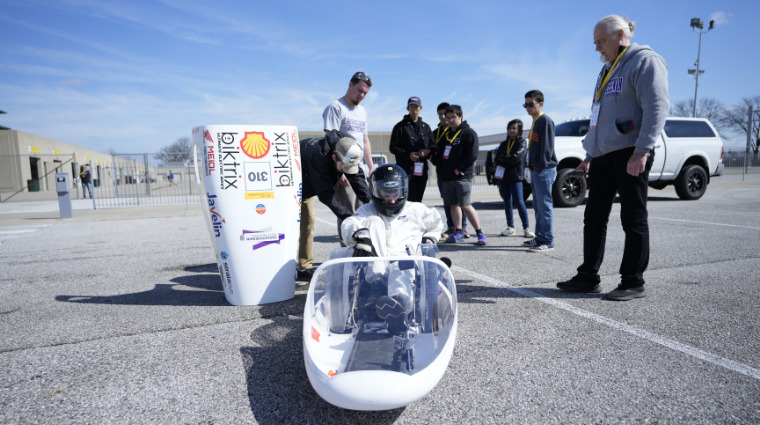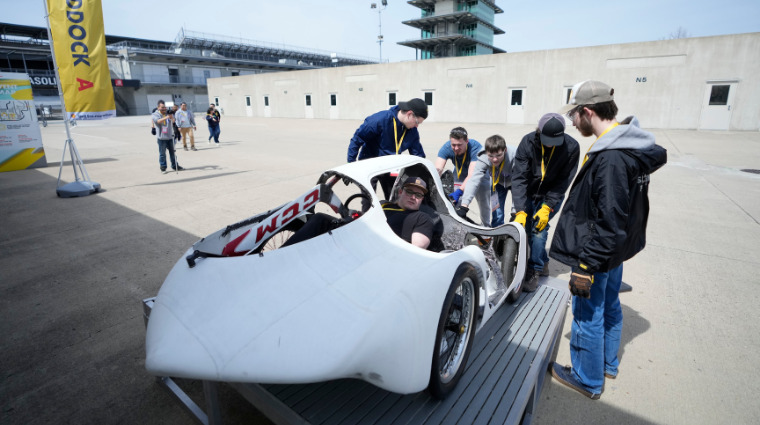
Sask Polytech students receive award for innovation and technical ingenuity
April 14, 2022 – Saskatchewan Polytechnic’s eco car team is returning from the Shell Eco-Marathon United States 2022 competition event at the world-famous Indianapolis Motor Speedway with the prestigious Technical Innovation Award.
While not the podium finish they had hoped for—races to test the limits of energy efficiency were cancelled because of bad weather—the Sask Polytech team was recognized for “demonstrating outstanding technical ingenuity along with optimal use of new materials, components, methodology or inventions.”
Sask Polytech students designed, built and tested two vehicles in the Urban Concept and Prototype categories for the Shell Eco-Marathon. The Urban Concept car received the off-track Technical Innovation Award for ingenuity in 3D printing the body of the car using recyclable materials. Special filament was used with a temperature triggered, active foaming technology to reduce the weight to one third of a traditional 3D printed part.
“I’m very proud of both of our student teams and their accomplishments,” says Tim Muench, program head for the Design and Manufacturing Engineering Technology program, who travelled with the teams to support them on the track at the Indianapolis Motor Speedway. “Throughout the competition students learn new technical skills, teamwork and how to work under pressure. At the racetrack students can see how other teams approach different design and manufacturing challenges. Congratulations to the team on their hard work and on and off the track! We are so proud of you.”
Under the direction of Muench and designated faculty advisor Andrew Baerg, Sask Polytech Design and Manufacturing Engineering Technology, Mechanical Engineering Technology, Machinist and Electronic Systems Engineering Technology students have been working on the two energy efficient cars since September 2021.
“Congratulations to our students for receiving the off-track Technical Innovation Award,” says Dr. Larry Rosia, Sask Polytech president and CEO. “The exceptional performance of our students at the Shell Eco-Marathon reflects well on their talents and skills, as well as on the quality of Sask Polytech’s programs and faculty who guided and supported this challenge. Throughout the Shell Eco-Marathon our students used their problem solving and teamwork skills to build innovative, energy efficient cars. Congratulations to all of our students and faculty involved!”
Sask Polytech’s prototype car is an ultra-efficient, lightweight vehicle designed for fuel economy. The body of prototype car was 3D printed and the frame is made of recycled carbon fiber hockey sticks. The car is quite small to reduce aerodynamic drag and rolling resistance and is Sask Polytech’s first electric car to enter the challenge. The prototype car passed technical inspections but did not get a chance to race at the Indianapolis Motor Speedway due to weather.
The urban concept car is designed for city driving and considers comfort and space for luggage, along with fuel economy. The urban concept car could potentially be used as a future commuter car and must include two doors, four wheels, full lighting, horn and brake functions. The aerodynamic body of Sask Polytech’s urban concept was 3D printed using recyclable plastic and the frame, of course, is made of recycled carbon fiber hockey sticks. It includes a 35-cc ice auger engine with a custom fuel injection system. The urban concept car also passed technical inspections and unofficially placed fourth in its category with 372 mpg US fuel efficiency.
Sask Polytech has been competing in the Shell Eco-Marathon since 2017. All cars built by Sask Polytech since 2018 for both categories have had a frame made from recycled carbon fiber hockey sticks.
Shell Eco-marathon is one of the world’s leading student engineering competitions focused on energy optimisation where teams are asked to design, build and drive some of the world’s most energy-efficient vehicles. Teams drive and compete for the best energy efficiency result in their vehicle class and energy category against teams from academic institutions.


Saskatchewan Polytechnic is signatory to the SDG Accord. Sustainable Development Goal alignment is one of the ways Sask Polytech is leading the rise of polytechnic education.


